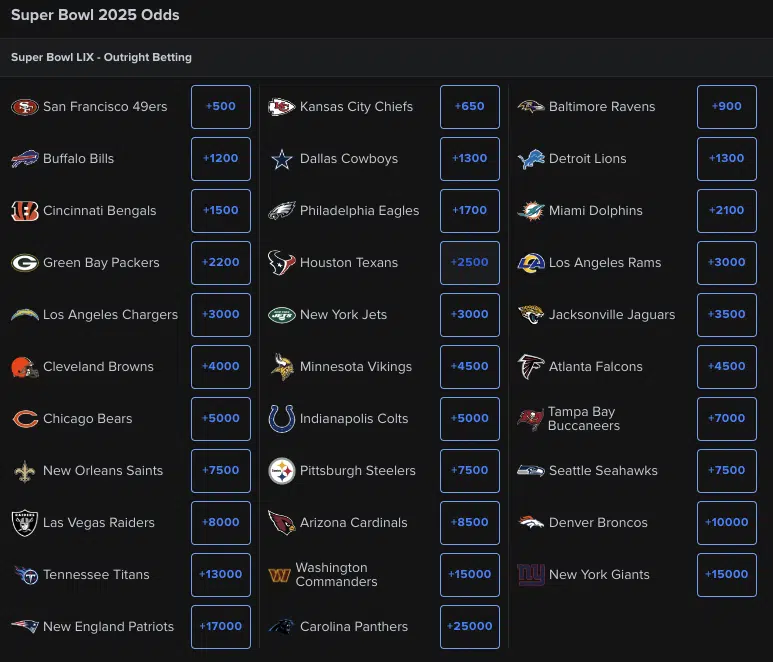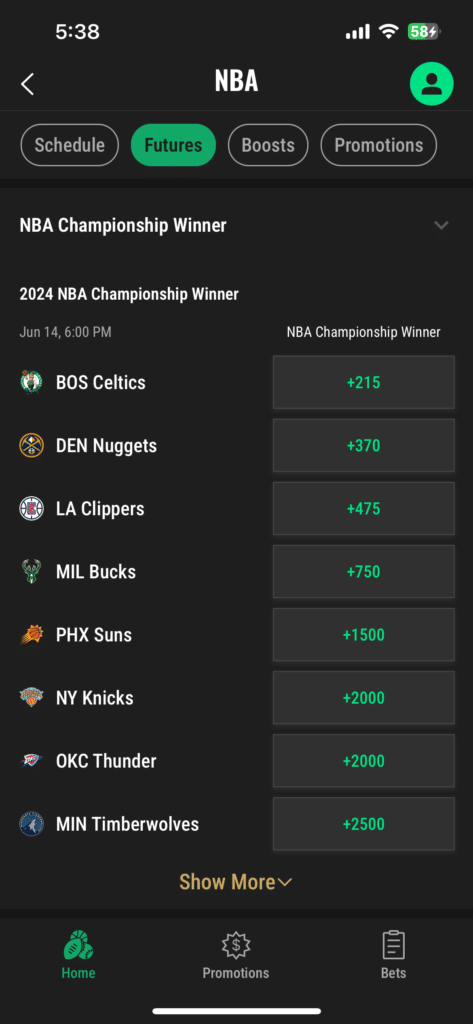Futures are an appealing option for new bettors. They’re uncomplicated, and the lines don’t fluctuate as quickly compared to other wagering formats. In this guide, BettingUSA explains how betting on futures works, which sports betting markets support them, and whether it’s ever a good idea to invest in a long-term wager.
Futures Betting Sites
 Bet $5 Get $150 If It WinsFanDuel Promo Code: Not Needed
Gambling Problem? Call 1-800-GAMBLER or visit RG-Help.com. Call 1-888-789-7777 or visit ccpg.org/chat (CT). Hope is here. GamblingHelpLineMA.org or call (800) 327-5050 for 24/7 support (MA). Visit www.mdgamblinghelp.org (MD). Call 1-877-8HOPE-NY or text HOPENY (467369) (NY). 21+ (18+ D.C.) and present in select states (for KS, in affiliation with KS Star Casino). First online real money wager only. $5 first deposit required. Bonus issued as nonwithdrawable bonus bets which expire 7 days after receipt. Restrictions apply. See terms at sportsbook.fanduel.com.
Bet $5 Get $150 If It WinsFanDuel Promo Code: Not Needed
Gambling Problem? Call 1-800-GAMBLER or visit RG-Help.com. Call 1-888-789-7777 or visit ccpg.org/chat (CT). Hope is here. GamblingHelpLineMA.org or call (800) 327-5050 for 24/7 support (MA). Visit www.mdgamblinghelp.org (MD). Call 1-877-8HOPE-NY or text HOPENY (467369) (NY). 21+ (18+ D.C.) and present in select states (for KS, in affiliation with KS Star Casino). First online real money wager only. $5 first deposit required. Bonus issued as nonwithdrawable bonus bets which expire 7 days after receipt. Restrictions apply. See terms at sportsbook.fanduel.com.
 Up to $1000 in Bonus BetsFanatics Sportsbook Promo Code: Not Needed
Must be 21+. GAMBLING PROBLEM? Call 1-800-GAMBLER
(CO/DC/IL/KS/KY/LA/MD/OH/MI/NC/NJ/PA/TN/VA/VT/WV/WY), (800)-327-5050 or http://gamblinghelplinema.org (MA), Call (877-8-HOPENY) or text HOPENY (467369) (NY), 1-800-NEXT-STEP or text NEXTSTEP to 53342 (AZ), (888) 789-7777 or http://ccpg.org (CT), or 1-800-BETS-OFF (IA), or 1-800-9-WITH-IT (IN), or www.mdgamblinghelp.org (MD), or morethanagame.nc.gov (NC), or 1800gambler.net (WV). $1,000 No Sweat Bets offer for customers in AZ, CO, CT, DC, IA, IL, IN, KS, KY, LA, MA, MD, MI, NC, NJ, OH, PA, TN, VT, VA, WV, or WY only. Must apply this promotion in your bet slip and place a $1+ cash wager with odds of -500 or longer each day for 10 straight days. Your 10 days begin the day you establish your account. Wager must settle as a loss to qualify for Bonus Bets. Bonus Bets will equal the amount of the losing wager(s) (up to $100 in Bonus Bets per day) and expire 7 days from issuance. This offer is not available in IL, NY, & NC. Terms apply- see Fanatics Sportsbook app.
Up to $1000 in Bonus BetsFanatics Sportsbook Promo Code: Not Needed
Must be 21+. GAMBLING PROBLEM? Call 1-800-GAMBLER
(CO/DC/IL/KS/KY/LA/MD/OH/MI/NC/NJ/PA/TN/VA/VT/WV/WY), (800)-327-5050 or http://gamblinghelplinema.org (MA), Call (877-8-HOPENY) or text HOPENY (467369) (NY), 1-800-NEXT-STEP or text NEXTSTEP to 53342 (AZ), (888) 789-7777 or http://ccpg.org (CT), or 1-800-BETS-OFF (IA), or 1-800-9-WITH-IT (IN), or www.mdgamblinghelp.org (MD), or morethanagame.nc.gov (NC), or 1800gambler.net (WV). $1,000 No Sweat Bets offer for customers in AZ, CO, CT, DC, IA, IL, IN, KS, KY, LA, MA, MD, MI, NC, NJ, OH, PA, TN, VT, VA, WV, or WY only. Must apply this promotion in your bet slip and place a $1+ cash wager with odds of -500 or longer each day for 10 straight days. Your 10 days begin the day you establish your account. Wager must settle as a loss to qualify for Bonus Bets. Bonus Bets will equal the amount of the losing wager(s) (up to $100 in Bonus Bets per day) and expire 7 days from issuance. This offer is not available in IL, NY, & NC. Terms apply- see Fanatics Sportsbook app.
 $1000 Bonus BetCaesars Sportsbook Promo Code: BUSA1000
Must be 21 or older and physically present in AZ, CO, IL, IN, IA, KS, KY, LA, ME, MD, MA, MI, NJ, NY, NC, OH, PA, TN, VA, WV, or WY. New users only. Must register using eligible promo code. First bet after registration must qualify. Max. Bonus Bet: $1,000. Bonus Bet expires 14 days after receipt. Void where prohibited. See Caesars.com/promos for full terms. Know When To Stop Before You Start®. Gambling Problem? CO, IL, KY, MD, MI, NJ, OH, TN, VA, WV, WY, KS (Affiliated with Kansas Crossing Casino), LA (Licensed through Horseshoe Bossier City and Harrah’s New Orleans), ME (Licensed through the Mi’kmaq Nation, Penobscot Nation, and Houlton Band of Maliseet Indians, federally recognized tribes located in the State of Maine), NC (Licensed through Tribal Casino Gaming Enterprise), PA (Affiliated with Harrah’s Philadelphia): If you or someone you know has a gambling problem, crisis counseling and referral services can be accessed by calling 1-800-GAMBLER (1-800-426-2537) or MD: visit mdgamblinghelp.org or WV: visit 1800gambler.net; AZ: Call 1-800-NEXT-STEP; IN: Call 1-800-9-WITH-IT; IA: Call 1-800-BETSOFF. ©2024, Caesars Entertainment
Gambling Problem? Call 1-800-GAMBLER
MA: CALL 1-800-327-5050 or visit gamblinghelplinema.org
NY: Call 877-8-HOPENY or text HOPENY (467369)
$1000 Bonus BetCaesars Sportsbook Promo Code: BUSA1000
Must be 21 or older and physically present in AZ, CO, IL, IN, IA, KS, KY, LA, ME, MD, MA, MI, NJ, NY, NC, OH, PA, TN, VA, WV, or WY. New users only. Must register using eligible promo code. First bet after registration must qualify. Max. Bonus Bet: $1,000. Bonus Bet expires 14 days after receipt. Void where prohibited. See Caesars.com/promos for full terms. Know When To Stop Before You Start®. Gambling Problem? CO, IL, KY, MD, MI, NJ, OH, TN, VA, WV, WY, KS (Affiliated with Kansas Crossing Casino), LA (Licensed through Horseshoe Bossier City and Harrah’s New Orleans), ME (Licensed through the Mi’kmaq Nation, Penobscot Nation, and Houlton Band of Maliseet Indians, federally recognized tribes located in the State of Maine), NC (Licensed through Tribal Casino Gaming Enterprise), PA (Affiliated with Harrah’s Philadelphia): If you or someone you know has a gambling problem, crisis counseling and referral services can be accessed by calling 1-800-GAMBLER (1-800-426-2537) or MD: visit mdgamblinghelp.org or WV: visit 1800gambler.net; AZ: Call 1-800-NEXT-STEP; IN: Call 1-800-9-WITH-IT; IA: Call 1-800-BETSOFF. ©2024, Caesars Entertainment
Gambling Problem? Call 1-800-GAMBLER
MA: CALL 1-800-327-5050 or visit gamblinghelplinema.org
NY: Call 877-8-HOPENY or text HOPENY (467369)
 $1500 In Bonus BetsBetMGM Bonus Code: BUSABONUS
Gambling problem? Call 1-800-GAMBLER (available in the US). Call 877-8-HOPENY or text HOPENY (467369) (NY). Call 1-800-327-5050 (MA). 21+ only. Please gamble responsibly. Call 1-800-NEXT-STEP (AZ), 1-800-BETS-OFF (IA), 1-800- 981-0023 (PR). First bet offer for new customers only. Subject to eligibility requirements. Bonus bets are non-withdrawable. In partnership with Kansas Crossing Casino and Hotel. See BetMGM.com for terms. US $1500 promotional offer not available in New York, Nevada, Ontario, or Puerto Rico.
$1500 In Bonus BetsBetMGM Bonus Code: BUSABONUS
Gambling problem? Call 1-800-GAMBLER (available in the US). Call 877-8-HOPENY or text HOPENY (467369) (NY). Call 1-800-327-5050 (MA). 21+ only. Please gamble responsibly. Call 1-800-NEXT-STEP (AZ), 1-800-BETS-OFF (IA), 1-800- 981-0023 (PR). First bet offer for new customers only. Subject to eligibility requirements. Bonus bets are non-withdrawable. In partnership with Kansas Crossing Casino and Hotel. See BetMGM.com for terms. US $1500 promotional offer not available in New York, Nevada, Ontario, or Puerto Rico.
 Bet $5 Get $150 Win Or LoseBet365 Bonus Code: BETUSAGAMBLING PROBLEM? CALL OR TEXT 1-800-GAMBLER (AZ, CO, IL, IN, KY, LA, NC, NJ, OH, PA, VA), 1-800-BETS OFF (IA) or 1-800-889-9789 (TN). 21+ only (18+ in KY). Must be present in AZ/CO/IA/IL/IN/KY/LA (select parishes)/NC/NJ/OH/PA/TN/VA. New Customer Offer Bet $5 and Get $150 in Bonus Bets at bet365. *Subject to meeting qualifying criteria. Minimum wager $5. Minimum odds -500 or greater. $10 minimum deposit. Paid in Bonus Bets. Bonus Bets wager excluded from returns. New customers only. Available in app only, time restrictions and T&Cs apply.
Bet $5 Get $150 Win Or LoseBet365 Bonus Code: BETUSAGAMBLING PROBLEM? CALL OR TEXT 1-800-GAMBLER (AZ, CO, IL, IN, KY, LA, NC, NJ, OH, PA, VA), 1-800-BETS OFF (IA) or 1-800-889-9789 (TN). 21+ only (18+ in KY). Must be present in AZ/CO/IA/IL/IN/KY/LA (select parishes)/NC/NJ/OH/PA/TN/VA. New Customer Offer Bet $5 and Get $150 in Bonus Bets at bet365. *Subject to meeting qualifying criteria. Minimum wager $5. Minimum odds -500 or greater. $10 minimum deposit. Paid in Bonus Bets. Bonus Bets wager excluded from returns. New customers only. Available in app only, time restrictions and T&Cs apply.21+ to Play, T&Cs Apply. Gambling Problem? Call 1-800-GAMBLER
Many sports bettors seek instant gratification. They place bets with the knowledge that their outcomes will be decided within hours, if not minutes.
Then there are the more patient types, who would gladly trade quick fixes for long-term entertainment value and potentially massive payouts. Futures bets are perfect for this group.
If straight bets are a sprint, then futures are a marathon. Their outcomes are often not determined for weeks, sometimes months.
Futures Betting and Odds Explained
A futures bet is a wager on the winner of a major event such as a league championship or a season-long accolade. They are not wagers on single games or matches and do not resolve on the same day they are placed.
In fact, futures are often available months in advance. For example, bettors can wager on the Super Bowl winner well before the start of the NFL season. Other examples of futures include the winner of the NBA’s MVP award or the MLB’s next World Series champion.
Unlike straight bets (point spreads, totals, etc.) that typically feature two teams or competitors, futures often feature dozens of contenders. As a result, even a favorite can pay out relatively long odds.
For example, FanDuel Sportsbook priced the San Francisco 49ers as the favorites to win the next Super Bowl and still gave them odds of +500. Other strong contenders like Kansas City Chiefs and Baltimore Ravens paid +650 and +900, respectively.
That’s a serious return on investment for some of the league’s strongest teams. To get the same odds on a single game, bettors would have to bet on a hapless underdog with little hope of winning.
Futures odds may not vary daily, but when they do shift, the movement can be significant. Injuries, trade acquisitions, wins, losses, and rumors can have substantial impacts. Due to the shroud of uncertainty surrounding season-long outcomes, futures tend to be one the least efficient betting markets. In other words, they make books nervous.
Types of Futures Bets by Sport
Team sports that utilize seasonal or league structures are tailor-made for futures. Here’s a look at some of the most common features by league:
- NFL: Super Bowl Winner, Divisional Winners, Regular Season Totals, and Most Rushing Yards
- College Ball: NCAAF Championship winner, Heisman winner, and NCAAB Championship
- MLB: League winners, World Series winner, Cy Young Award, and MVP winners
- NBA: Championship Winner, winning state, point per game leader, and assists leader
- NHL: Stanley Cup winner, Divisional winners, and Hart and Vezina Trophy winners
- Soccer: League and World Cup winners
Books may also offer futures on individual sports. Golf is a good example, as it supports major annual tournaments like The Masters and the US Open. However, the scope of futures is more restrictive for individual sports since bettors can only wager on individual showings and not team performances.
Sports like boxing and MMA do not lend themselves well to futures because each fight is an individual result, and there is no season-long championship to consider.
All major betting apps offer futures, although the menu varies from one sportsbook to the next. Some take a tried-and-true approach, but recent trends have been more toward the outlandish. For instance, DraftKings pushes boundaries. Bets on who will be the 7th seed in the NBA Eastern Conference or Cam Newton’s next team are just a few of the unconventional futures users will find on the DraftKings app.
How to Place Futures Bets Online
The exact location of futures differs slightly from book to book, but once bettors know where to find them on one app, locating them on another should be a breeze.
Let’s consider Caesars Sportsbook as an example:
- Log in to the Caesars Sportsbook app or website. Make sure geolocation services are enabled.
- Navigate to a sport that offers futures bets, such as football or basketball. Users can find it on the left navigation menu via desktop or the top nav menu on the app.
- At the top of the screen, there will be a button called “Future Bets.” Click or tap it, and the sportsbook will display all futures for that league.
- Select a desired futures bet from one of the submenus.
- The bet slip will appear, where bettors will enter the amount they’d like to wager.
- Add more bets to convert the wager into a parlay or round-robin (optional)
- Submit the bet and enjoy the sweat.
Futures Betting Pros and Cons
The primary upside of betting futures is that a single wager can provide months of entertainment.
The entertainment factor may also positively impact bankrolls, as bettors who place futures wagers may feel less inclined to bet throughout the season.
Another pro is that there is often value to be found by betting futures. Odds deviate wildly from book to book, and bettors willing to do a bit of line shopping are bound to find a decent deal.
To get a sense of these deviations, the Buffalo Bills were priced early in the last NFL season at +850 to win the Super Bowl on FanDuel, +800 on Caesars, and only +750 on DraftKings. A Bills fan who only uses DraftKings would be missing out.
On the other hand, straight bet odds tend to be more static. They vary, but the differences are often minuscule.
However, futures betting is not all roses. The main drawback is that the theoretical hold on futures ranges from high to through the roof. For futures with only a handful of candidates, like NFL Divisional winners, the vigorish hovers around 6-9%. That’s more than the tax on most straights (4-5%), but still within reason.
When there are dozens of potential winners, the vigorish is significantly higher. On Super Bowl futures, it usually ranges from about 16-18%. Keep in mind that oddsmakers are highly efficient at crafting accurate NFL lines and are therefore more comfortable offering players a better deal. For a 32-team league, a 16-18% house edge is considered low!
For niche markets, oddsmakers don’t have the same level of confidence. The more uncertainty, the higher the vigorish. The theoretical hold on less efficient markets may reach as high as 30%. This is not only among the highest holds in sports betting but in all of gambling.
Another obvious downside of futures bets is that they lock up bettors’ funds for long periods of time. Those funds won’t be earning interest, and bettors cannot use them to place other wagers. They’re effectively gone until the bet settles. The lack of liquidity may entice bettors to reach further into their wallets later in the season than they would otherwise, especially if it looks like their futures bet will be a loser.
One final tip: Regionality plays a role in futures odds. Bettors from NJ may find that the odds on their home team are worse than the industry average because they attract so many wagers. Or the book may offer better lines on home favorites as a sign of goodwill or a part of a promotion. Be on the lookout.
Futures Betting FAQ
Robert Dellafave is an expert sports bettor, professional gambler, and advocate for the fair treatment of sports bettors.


